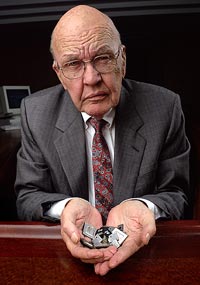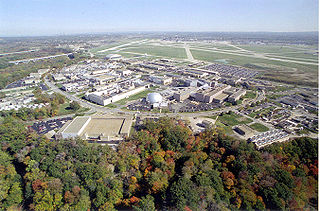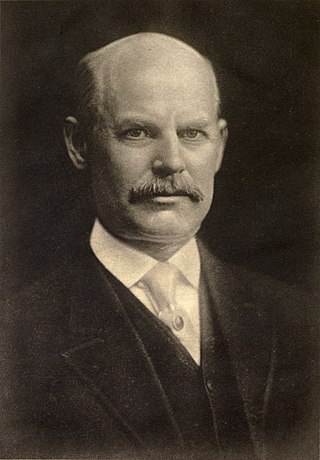Related Research Articles

Jack St. Clair Kilby was an American electrical engineer who took part, along with Robert Noyce of Fairchild Semiconductor, in the realization of the first integrated circuit while working at Texas Instruments (TI) in 1958. He was awarded the Nobel Prize in Physics on 10 December 2000.

Silicon carbide (SiC), also known as carborundum, is a hard chemical compound containing silicon and carbon. A wide bandgap semiconductor, it occurs in nature as the extremely rare mineral moissanite, but has been mass-produced as a powder and crystal since 1893 for use as an abrasive. Grains of silicon carbide can be bonded together by sintering to form very hard ceramics that are widely used in applications requiring high endurance, such as car brakes, car clutches and ceramic plates in bulletproof vests. Large single crystals of silicon carbide can be grown by the Lely method and they can be cut into gems known as synthetic moissanite.

NASA John H. Glenn Research Center at Lewis Field is a NASA center within the cities of Brook Park and Cleveland between Cleveland Hopkins International Airport and the Rocky River Reservation of Cleveland Metroparks, with a subsidiary facility in Sandusky, Ohio. Its director is James A. Kenyon. Glenn Research Center is one of ten major NASA facilities, whose primary mission is to develop science and technology for use in aeronautics and space. As of May 2012, it employed about 1,650 civil servants and 1,850 support contractors on or near its site.

Janet Lynn Kavandi, a native of Carthage, Missouri, is an American scientist and a NASA astronaut. She is a veteran of three Space Shuttle missions, served as NASA's Deputy Chief of the Astronaut Office, and was the Center Director at the NASA Glenn Research Center in Cleveland, Ohio from March 2016 until her retirement from NASA in September 2019. She was inducted into the United States Astronaut Hall of Fame in 2019.

Edward Goodrich Acheson was an American chemist. Born in Washington, Pennsylvania, he was the inventor of the Acheson process, which is still used to make silicon carbide (carborundum). Acheson founded the Carborundum Company in 1891 and became a manufacturer of carborundum and synthetic graphite.

Annie Easley was an African American computer scientist and mathematician who made critical contributions to NASA's rocket systems and energy technologies.

George Robert Carruthers was an American space physicist and engineer. Carruthers perfected a compact and very powerful ultraviolet camera/spectrograph for NASA to use when it launched Apollo 16 in 1972. Carruthers was inducted into the National Inventors Hall of Fame in 2003, and in 2011 he was awarded the National Medal for Technology and Invention.

The Great Lakes Science Center is a museum and educational facility in downtown Cleveland, Ohio, United States. Many of the exhibits document the features of the natural environment in the Great Lakes region of the United States. The facility includes signature (permanent) and traveling exhibits, meeting space, a cafe, and an IMAX Dome theater.

Olga D. González-Sanabria is a Puerto Rican scientist and inventor. She is the highest-ranking Hispanic at NASA Glenn Research Center, and a member of the Ohio Women's Hall of Fame. González-Sanabria, Director of the Engineering and Technical Services, is responsible for planning and directing a full range of integrated services including engineering, fabrication, testing, facility management and aircraft services for the Glenn Research Center. She played an instrumental role in the development of the "Long Cycle-Life Nickel-Hydrogen Batteries" which helps enable the International Space Station power system.

Edith Marie Flanigen is a noted American chemist, known for her work on synthesis of emeralds, and later zeolites for molecular sieves at Union Carbide.

George Edward Alcorn Jr. was an American physicist, engineer, inventor, and professor. He taught at Howard University and the University of the District of Columbia, and worked primarily for IBM and NASA. He has over 30 inventions and 8 patents resulting in his induction into the National Inventors Hall of Fame in 2015.

Esan North-East is a Local Government Area located in Edo State of Nigeria. It has an estimated population of 119,346. Its headquarters are in Uromi/Uzea.
James Franklin Hyde was an American chemist and inventor. He has been called the “Father of Silicones” and is credited with the launch of the silicone industry in the 1930s. His most notable contributions include his creation of silicone from silicon compounds and his method of making fused silica, a high-quality glass later used in aeronautics, advanced telecommunications, and computer chips. His work led to the formation of Dow Corning, an alliance between the Dow Chemical Company and Corning Glass Works that was specifically created to produce silicone products.
Dawon Kahng was a Korean-American electrical engineer and inventor, known for his work in solid-state electronics. He is best known for inventing the MOSFET, along with his colleague Mohamed Atalla, in 1959. Kahng and Atalla developed both the PMOS and NMOS processes for MOSFET semiconductor device fabrication. The MOSFET is the most widely used type of transistor, and the basic element in most modern electronic equipment.

Yvonne Madelaine Brill was a Canadian American rocket and jet propulsion engineer. She is responsible for inventing the Electrothermal Hydrazine Thruster (EHT/Resistojet), a fuel-efficient rocket thruster that keeps today’s satellites in orbit, and holds a patent for its invention. During her career she was involved in a broad range of national space programs in the United States, including NASA and the International Maritime Satellite Organization.
Silicon carbide fibers are fibers ranging from 5 to 150 micrometres in diameter and composed primarily of silicon carbide molecules. Depending on manufacturing process, they may have some excess silicon or carbon, or have a small amount of oxygen. Relative to organic fibers and some ceramic fibers, silicon carbide fibers have high stiffness, high tensile strength, low weight, high chemical resistance, high temperature tolerance and low thermal expansion. (refs) These properties have made silicon carbide fiber the choice for hot section components in the next generation of gas turbines, e.g. the LEAP engine from GE.

Zephyr is a concept of a robotic Venus rover for a mission called Venus Landsailing Rover. This mission concept would place a rover on the surface of Venus that would be propelled by the force of the wind. The rover would be launched together with a Venus orbiter that would be a communications relay and perform remote atmospheric studies.

Julian Manly Earls is an American physicist who worked for NASA for over forty years. He has been awarded two NASA Exceptional Achievement Medals and was inducted into the Presidential Rank Award of the Senior Executive Service by both Bill Clinton and George Bush.

Lisa Marie Spellman Porter is an American materials scientist who is a Professor of Materials Science at Carnegie Mellon University. She works on new ways to process and characterise electronic materials. She has previously served as president of the American Vacuum Society.
References
- ↑ "Alumni roll out drums to celebrate IBHS at 80". The Guardian Nigeria News - Nigeria and World News. 2018-11-03. Retrieved 2021-07-14.
- 1 2 Fabiawari, Ibaranyanakaye (2020-11-22). "Nigerian emerges fourth Black to be inducted into US NASA's Inventors Hall of Fame". TODAY. Retrieved 2021-07-14.
- 1 2 3 4 "Nigerian-American scientist, Robert Okojie, honored by NASA". 2020-11-22. Retrieved 2021-07-14.
- ↑ "Nigerian-American scientist, Robert Okojie, honoured by NASA". 2020-11-22. Retrieved 2022-03-17.
- ↑ Contributor (2015-03-06). "INTRODUCING NIGERIANS IN THE DIASPORA- Dr. Robert Okojie " The Man Behind NASA Success Stories"". AfriQtalk Diaspora. Retrieved 2021-07-14.
{{cite web}}:|last=has generic name (help) - ↑ "Values, Re-orientation and National Renewal". THISDAYLIVE. 2020-12-11. Retrieved 2021-07-14.